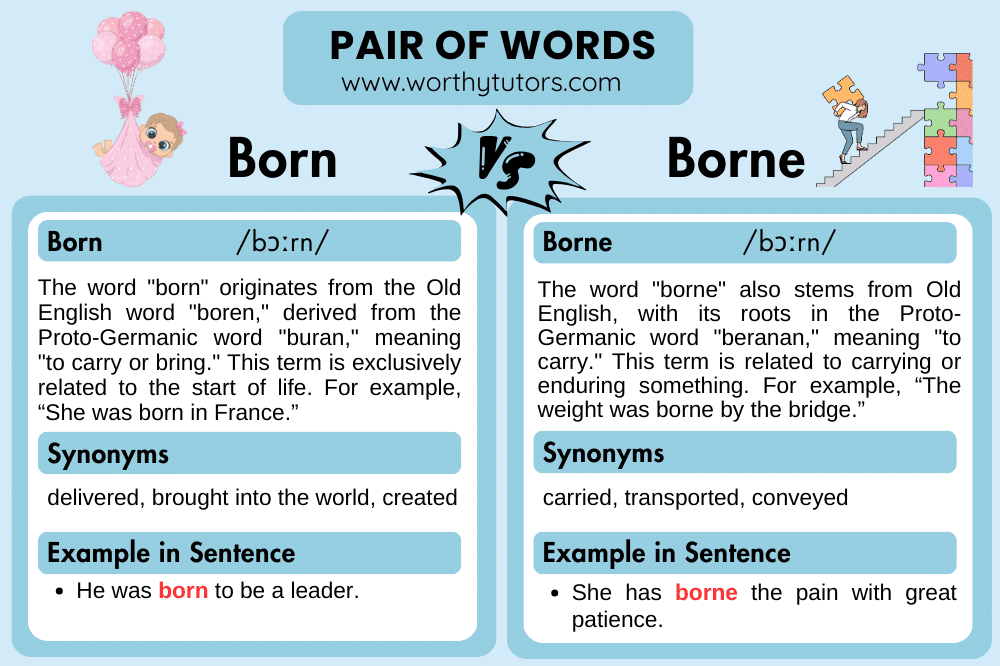
Differences Between “Born” and “Borne”
The words “born” and “borne” are often mixed up because of their similar spellings and pronunciations. However, they have distinct meanings and uses in the English language. This article will provide a detailed look at these two words, including their pronunciation, synonyms, meanings, usage, examples, and a conclusion.
Born
Pronunciation of Born
Born is pronounced as /bɔːrn/ “bawrn.”
Meanings of Born
“Born” is the past participle form of the verb “to bear,” which means to give birth to or originate from.
Synonyms of Born
Synonyms for “born” include:
- Delivered
- Brought into the world
- Created
Etymology and Explanation of Born
The word “born” originates from the Old English word “boren,” derived from the Proto-Germanic word “buran,” meaning “to carry or bring.” This term is exclusively related to the start of life. For example, “She was born in France” means she began her life in France.
Examples of Born in Sentences
- She was born in Paris.
- The idea was born out of necessity.
- He was born to be a leader.
- The company was born from a desire to innovate.
Borne
Pronunciation of Borne
Borne is pronounced as /bɔːrn/ “bawrn.”
Meaning of Borne
“Borne” is the past participle form of the verb “to bear,” which means to carry or support.
Etymology and Explanation of Borne
The word “borne” also stems from Old English, with its roots in the Proto-Germanic word “beranan,” meaning “to carry.” This term is related to carrying or enduring something. For example, “The weight was borne by the bridge” means the bridge carried the weight.
Synonyms of Borne
Synonyms for “borne” include:
- Carried
- Transported
- Conveyed
Examples of Borne in Sentences
- The ship was borne by strong winds.
- The burden was borne by the entire team.
- The responsibility for the project was borne by the manager.
- The message was borne across the sea by radio waves.
- She has borne the pain with great patience.
Key Differences Between “Born” and “Borne”
While both “born” and “borne” are past participle forms of the verb “to bear,” they are used in different contexts. “Born” refers to birth or origin, while “borne” pertains to carrying or supporting something.
Summary
While “born” and “borne” sound identical, their meanings are quite different. “Born” is associated with birth and the beginning of life, whereas “borne” relates to carrying or enduring. Understanding these distinctions is crucial for accurate communication and writing.
Fill in the Blank Exercise on Born vs. Borne
- Paris is the city where I was _____.
- The weight of the situation was too heavy to be _____ by one person.
- His talent for music was _____ from his parents.
- The message was successfully _____ to the recipient.

About Authoress
Mahnoor Jehangir is a seasoned educator and linguist, specializing in English language and literature. With a master’s degree in English and applied linguistics, Mahnoor serves as a subject lead, while also indulging her passion for writing, exploring the nuances of language and storytelling.